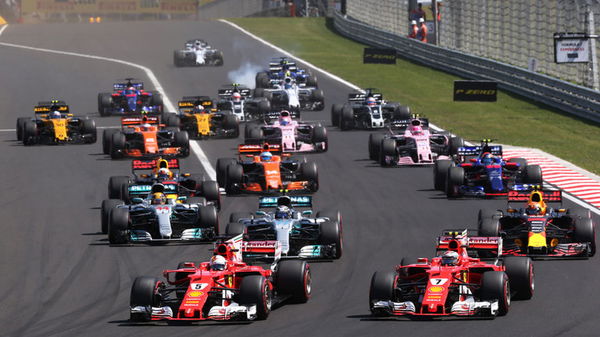Why Manufacturers are Shunning Formula One

Follow Us

Ford doesn’t fancy it. Neither does BMW. Toyota is also out. Formula 1’s bold new era under new owner Liberty Media began with three of the world’s major car manufacturers ruling themselves out of a return to the pinnacle of motorsport.

Mercedes, Renault, McLaren and Ferrari are committed to F1 until at least 2020. Honda has also insisted its involvement in F1 is long term. But should new chief Chase Carey and co. be concerned about the future?
ADVERTISEMENT
Article continues below this ad
F1: a too pricey an affair for the manufacturers

BMW is happy with its DTM and GT racing programmes while it is also poised to a full-entry in Formula E for the 2018/19 season. Toyota’s commitment, meanwhile, is to the World Endurance Championship and World Rally Championship. And last year, Audi said F1 was not on its agenda either. Later it pulled out of the WEC ostensibly to focus on Formula E.
It’s a massive kick in the teeth to F1, which in 2003/04 had eight manufacturers (or on paper, nine) involved – Ferrari, BMW, Mercedes, McLaren, Renault, Honda, Toyota and Jaguar/Ford. A decade later and that number has almost halved with just Ferrari, Renault, Mercedes, McLaren and Honda still around.
The tussle between the new and the old:
The new hybrid engines were brought into the sport to entice new manufacturers. Adding electric technology into the engines was done to make it more road relevant. Notice the road relevant part for that is the keyword for manufacturers.
At that point there were only three manufacturers. Honda then came onboard but it was not exactly the flurry that had been hoped for. Equally, the Japanese manufacturer’s very public struggle was hardly what was needed to entice prospective manufacturers to join the party.
In a bid to get more manufacturers, FIA sent out the invites to many to join it in making the engine regulations for the future. The likes of Porsche, Aston Martin, Lamborghini joined the discussions. Independents like Cosworth and Illmor too were involved in the discussions. The new engines have garnered a positive response from the new prospective entrants. But on the other hand, it has forced the existing ones to throw their toys out of the pram.
But, it’s going to take a mighty push to encourage car or engine makers back into F1.
Formula E is thriving though:
In Formula E, the interest is growing. Renault is already involved, winning last year’s drivers’ and teams’ titles with the factory-backed e.dams squad. Citroen’s sister brand DS competes with Virgin Racing. Jaguar made its debut last season.
BMW has an engineering partnership with the Andretti team with an eye on a fully-fledged factory entry from 2018/19. Audi has upped its involvement in the Abt team to induct it into its works motorsport programmes.

Mercedes has secured an entry for the 2018/19 season, when the electric series intends to switch to single-car races. Even Sauber has said it seriously considered taking up an entry slot for the inaugural Formula E season. It is still evaluating doing so in the future.
In announcing Mercedes’ Formula E interest, motorsport boss Toto Wolff said: “Electrification will play a major role in the future of the automotive industry. Racing has always been a technology R&D platform for the motor industry, and this will make Formula E very relevant in the future.”
Mercedes remains contractually committed to F1 until the end of the 2020 season. However, it is noteworthy that it suggested Formula E is the future with its technology a key reason for getting involved.
It echoes its push in F1 in recent years towards a hybrid turbo engine. But the 2020 regulations are dumbing down the hybrid engines a little bit. Ferrari has threatened to pull out and Mercedes has sided with the Italian marquee. And this is bad news for Liberty and the championship.
In a plus point for F1, Renault will be pulling out of Formula E in 2018-19 and will be replaced by Nissan.
Manufacturers come and go…
If BMW, Ford, Toyota and Audi feel that F1 is too expensive, then something is wrong. Liberty should look to address those two areas as a matter of urgency.
But on the other hand, in Mercedes, Ferrari, Renault, McLaren and Honda, it has five manufacturers who have committed long-term to F1. They continued sticking with the series through the various regulation changes. Therefore, it must be doing something right.
History proves that manufacturers come and go. There are always a handful that stay because they know their presence in F1 is good for business. Tasting success will only have a positive impact on its road car sales.

Toyota and BMW knew how important winning was and that’s why they joined the grid. When they didn’t achieve it, they left. Mercedes, in contrast, persevered and has 4 drivers’ and constructors’ titles to show for it.
Looking at motor racing series across the world, the truly global ones – such as F1, the WEC, WRC and MotoGP – retain a solid manufacturer presence. It suggests that for manufacturers, retaining their place in a championship that spans several countries remains important.
Manufacturers are not the ingredients for success
A complete manufacturer pull-out from F1 is unlikely, but could it cope with only a handful in the long term? In 2003, there were seven manufacturers and it was a thrilling season. Five different teams won, eight different drivers took a victory. Three teams were in the title fight – Ferrari (Michael Schumacher), Williams (Juan Pablo Montoya) and McLaren (Kimi Raikkonen) until late in the season before Schumacher clinched his sixth title.
But the following year, with seven manufacturers still involved, was not so exciting. Schumacher won 12 of the first 13 races. Ferrari won 15 in total as Williams, McLaren and Renault shared the remaining three wins between them.

Figures from the last 20 years suggest big manufacturer presence isn’t critical to ensure an exciting championship. And while F1 has had a decline in the number of manufacturers involved, the number has not dropped below three in the last 20 years.
Bottom Line:
ADVERTISEMENT
Article continues below this ad
One could argue that the more manufacturers in F1, the less likely it is that more will join. Because the chances of a manufacturer winning, and therefore getting a return on its investment, becomes lower. That explains why, over the years, manufacturers have dipped in and out of F1.
Even that has ensured there has been a consistent manufacturer presence – regardless of whether the quantity and variants change. So there’s no need to panic when BMW, Toyota and Ford decline interest in F1. Because the likes of Aston Martin and Porsche has. Not to forget independent engine suppliers like Cosworth and Ilmor has shown interest too.
Who says the other manufacturers won’t change their mind if a couple of current manufacturers drop out. That’ll suddenly increase the chances of success and subsequent return on investment. F1 is a mix of manufacturers and independents. It’s a balance which is likely to continue to ebb and flow.
ADVERTISEMENT
Article continues below this ad
Therefore the aim should not be to increase the tally. Rather the sport should content itself with having the minimum healthy number of manufacturers onboard. The natural forces, just like Adam Smith argued, will correct the situation and bring the whole environment into an equilibrium. What Liberty should focus on, is ensuring that the racing remains enthralling for the fans.

